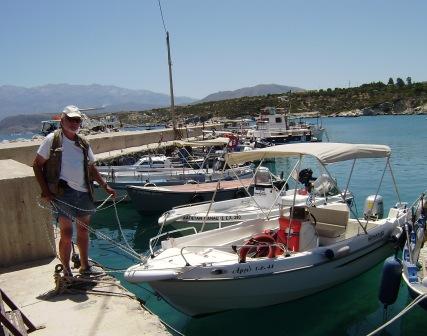Check Out My Recommendation of:
Reviewing Core Concepts - PREselling Through Content
At its most elementary level, the inner workings of an
affiliate program are pretty simple. An affiliate program
member inserts his/her unique tracking link into a Web page.
Visitors click on that link, and are taken to the merchant
partner's site. If all goes well, the referred visitor
makes a purchase, and the affiliate earns a commission.
Simple right? Well sort of. Here's the clincher...
A referral is basically a recommendation of sorts. The more
effective that recommendation is, the more likely the
referred visitor is to buy. The term used to measure the
effectiveness of these referrals is called a "Conversion
Rate." For example...
At SiteSell, the average Conversion Rate for affiliates is
just above 2%. That means on average, 2 out of every 100
referred visitors make a purchase. But 2% is *only* the
average. We have affiliates who consistently convert 5%-10%
of their referrals. A couple even manage to convert close
to 20% of ALL the visitors they refer to us.
You'll have to admit... that's quite impressive!
Of course, that's only one side of the coin. We also have
affiliates that convert 0.10% (1 sale for every 1,000
referrals) and 0.01% (1 sale for every 10,000 referrals).
Big range, right?
So what's the difference between an affiliate who converts
10 referrals (out of 100) into paying customers, and one that
converts 1 referral (out of 1,000) into a paying customer?
That's a good question.
Let me return to the point I made earlier...
A referral is a recommendation of sorts. The question
therefore, should be...
"What constitutes an *effective* recommendation?"
Consider life in the offline world for a minute. Which
recommendations are you most likely to heed?
That's right, the ones from people you TRUST. People you
know to have YOUR best interests at heart, and not their
own. When you're buying car for instance, you're more
likely to heed the advice of an old friend who works as an
automotive journalist then the car salesman at the local
dealership.
In other words, you recognize that the car salesman's
recommendation is motivated by THE SALE. That changes the
face of things significantly, does it not?
OK, now extrapolate that into an online environment.
Obviously, your visitors aren't likely to be people you
know personally, right? So...
How do you get them to trust you to the point that they
heed your recommendations?
Another good question. The answer?...
1) You have to establish yourself as someone who is
knowledgeable within your chosen field.
2) You have to demonstrate your knowledge in such a way that
your recommendations are viewed as impartial.
AND...
3) Your recommendations MUST be in the best interest of your
visitor.
I've no doubt that we've all seen some pretty
crass PREselling efforts. It's not difficult
to realize that the PREseller has never used
the product, and is making the recommendation
purely for the commission.
Crass recommendations simply don't generate
commissions.
So how do you accomplish those three important goals (from
above)?
Simple. Follow these steps...
o Provide your visitor with lots of high quality content.
o Offer links to merchant partners as a way to enhance your
visitor's surfing experience, and not simply to generate
income.
o Be patient. Gain your visitor's trust -- don't instantly
bombard her with a sales pitch upon her arrival to your site.
o GIVE, then TAKE. You want a visitor to investigate a
recommendation? You'll have better luck if you provide her
with something in return first -- benefits, value
information... something that SHE is searching for.
All these critical steps are directed at improving the
efficiency of your PREselling tactics. One, however, is
particularly important.
It's the very first step –
Provide your visitor with lots of high quality CONTENT.
Content is the KEY to your affiliate business success.
Why?
First of all, it establishes your credibility with your
visitors. Nothing builds trust and focuses on the KEY
concept of GIVING before TAKING than *CONTENT*.
Secondly, it addresses the way the Internet is used. Most
people don't go online to buy -- they go online to research.
There is a third reason why content is
important, although I'm not going to discuss
it in this article...
Search Engines LOVE content. If you can't
afford to buy traffic, then quality content
is the best (and really the ONLY) way to get
targeted visitors to your site.
For example...
Let's assume you're looking to buy a new car. You test drive
a couple of suitable models at various local dealerships.
Then you return home and fire up the computer. Are you
planning to buy your car online?
Very doubtful.
You recognize that a car salesman's job is to sell cars and
earn commissions. That means his recommendations aren't
likely to be impartial. So you go online to get the real
dirt on each model -- critical reviews from auto-journalists,
posts from disgruntled owners, anything that will give you a
better look at the *BIG* picture.
That's the real value of the Net.
Let's suppose you are an affiliate of Autobytel (an online
company that saves car buyers money by acting as a broker
for the deal)...
http://www.autobytel.com/
Which way will you build your site to get as many
ready-to-buy visitors clicking through to your partner's
site?...
OPTION A) Take 5 minutes to build a low quality site, with a
link titled...
"Click here to save BIG dollars on your new car!"
OR...
OPTION B) Target a specific segment of the car market
(compacts, sub-compacts, domestics, imports, SUVs,
performance vehicles, etc, etc.) and build an information
resource center that really provides value to your visitor
-- a resource base that critically analyzes selected models,
documents faults and benefits, and compares costs and
features across all models.
Let's take a closer look at option A. Sure it's easy, and
sure it's cheap, but it won't do anything for you. Why?
First, the recommendation doesn't carry any weight. Second,
you haven't provided your visitor with what she was really
looking for -- INFORMATION.
In other words, she's not ready to buy yet -- not from her
local dealer, and not from Autobytel.com. Yes, she might
follow the link to Autobytel.com, but what she finds isn't
what she needs NOW.
Click -- bye bye!
OK, now let's zero in on option B. Yes, this type of site
will require research, and a significant investment of your
time. But it will be worth it.
Suppose you target imports, specifically compacts and
subcompacts. On the site, you provide critical reviews
(including comments from industry analysts and other
professionals) of the Mazda Protege, the Honda Civic, the
Subaru Impreza, and the Toyota Corolla.
What is your #1 goal?
To provide your visitor with enough information so that by
the time she clicks through to your partner's site
(Autobytel), she's ready to buy.
At that point, it's the merchant's job to sell their service
to your referral. That's NEVER your job.
Bottom line?
Intercept your visitor as she searches for information.
GIVE her that information before sending her through (TAKE)
to your merchant partner's site.
GIVE, then TAKE.
The CRITICAL PREselling concept.
This system, properly implemented, simply
WORKS. And Site Build It! takes you through
it flawlessly, every step of the say.
Please, as Tom Cruise says in Jerry Maguire,
one of my favorite films...
"Help me to help you..."
If you are struggling with your affiliate
business, check out the NEW Site Build It!
site for a clear explanation of how and what
SBI! can do for you...
You'll know in a minute or two whether SBI! is right for
you.
As well, SBI!'s "Risk-Free Try It" refund
policy provides you with the opportunity to
see first-hand how the whole system works.
Use it as your "free trial"
Written by Ken Evoy, M.D.
President of SiteSell.com Inc.
(c) copyright 2002 SiteSell.com Inc.
MYCPS! teaches a critical life skill, one that anyone can do. And yet it is not taught in school. In the real world, we simply MUST learn to communicate effectively. The Internet is no exception.
The book Make Your Content Presell is now free!
|
|


























